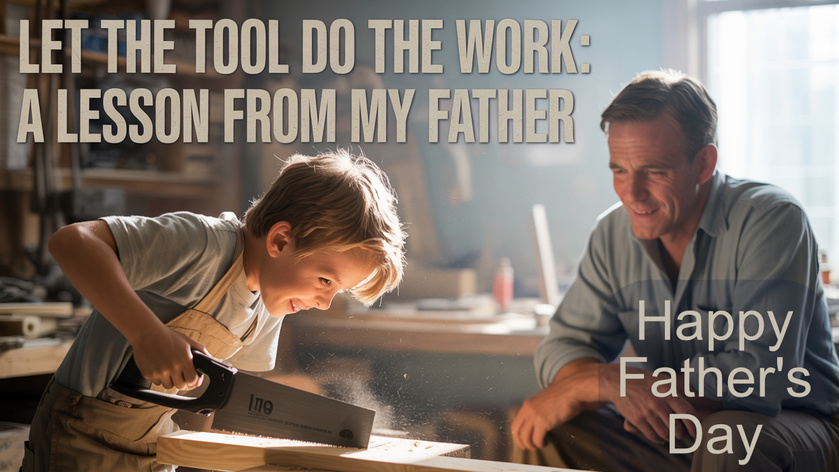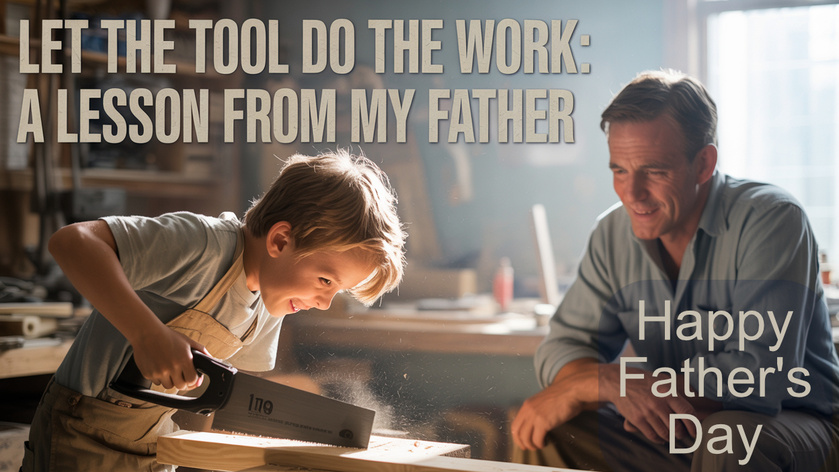This Sunday, people will hand out ties, cards, and mugs that say #1 Dad. But if you ask me what makes a father truly irreplaceable, it’s not something that fits in a box — it’s moments like this:
I will never forget my father teaching me how to use tools. I was just a small boy, determined to show him what I could do. He set me up with a saw and a scrap of wood, probably scrap to him — but a treasure to me.
Like most little boys trying to impress Dad, I thought speed was skill. So I attacked that piece of wood with gusto, sawing as fast as my arms would move. Any other adult might have barked at me to slow down. Maybe laughed and said, “Whoa there, where’s the fire?” Or worse — grabbed the saw and finished it for me.
But that’s not what my father did. He didn’t judge. He didn’t scold. He watched, sized up the situation, and then said something calmly that has stuck with me my whole life:
“Let the tool do the work.”
That one line has saved me frustration more times than I can count — not just with saws and hammers, but in every area of life where patience and trust matter more than brute force. He gave me guidance I could actually hear at that age. He didn’t shame me for being eager; he directed my energy and gave me a principle to rely on.
That’s good fathering.
Why Fathers Matter in a Way No One Else Can
Stories like mine are not unique — but they are becoming more rare with father’s being removed form the home. Too often we forget what fathers bring to the table that no one else does. We reduce them to extra hands or bonus paychecks. We pretend they’re interchangeable or optional. But deep down, and in study after study, we know better.
Fathers model calm strength under pressure. They teach boys how to be men without brute force — and teach girls what true masculinity feels like when it’s steady, protective, and kind. They bring a different energy to parenting: one that sets boundaries, tests limits through rough play, and then pulls children back into safety and love when they fall.
Dads don’t always use a lot of words, but they teach through presence, through small gestures, and through the unspoken lesson: “You can handle this — but if you can’t, I’m here.”
What Happens When Fathers Are Missing
We don’t talk about it much on Father’s Day, but we should: when dads disappear, children pay the price. Boys lose their guide for channeling power responsibly. Girls lose their first experience of what it feels like to be loved and respected by a good man.
The numbers bear it out: more school dropouts, more juvenile crime, more emotional struggles. A father’s absence ripples outward for generations.
Imperfect But Irreplaceable
Fathers aren’t flawless — they never have been, and they don’t have to be. For me, what mattered was that he was present. He noticed things. He knew when to offer a hand and when to let me stumble and figure it out on my own.
When I look back on that day with the saw, I realize something else: he didn’t just teach me how to cut a board. He taught me how to trust the process, how to be patient, and how to use the tools life gives me — not to force everything with my own strength.
That is fatherhood at its best: presence without suffocation, correction without shame, guidance that lasts far longer than childhood.
This Father’s Day, Let’s Remember
As we celebrate dads this weekend, let’s remember: it’s not about what we buy them, but about what they have given us — quietly, daily, in moments so ordinary we don’t even know they shaped us.
If you’re a father reading this, take heart: your calm words today may echo in your child’s mind for decades to come. You don’t need to have all the right answers. Just be there. Watch. Guide. And every so often, remind them:
“Let the tool do the work.”
Happy Father’s Day.




















